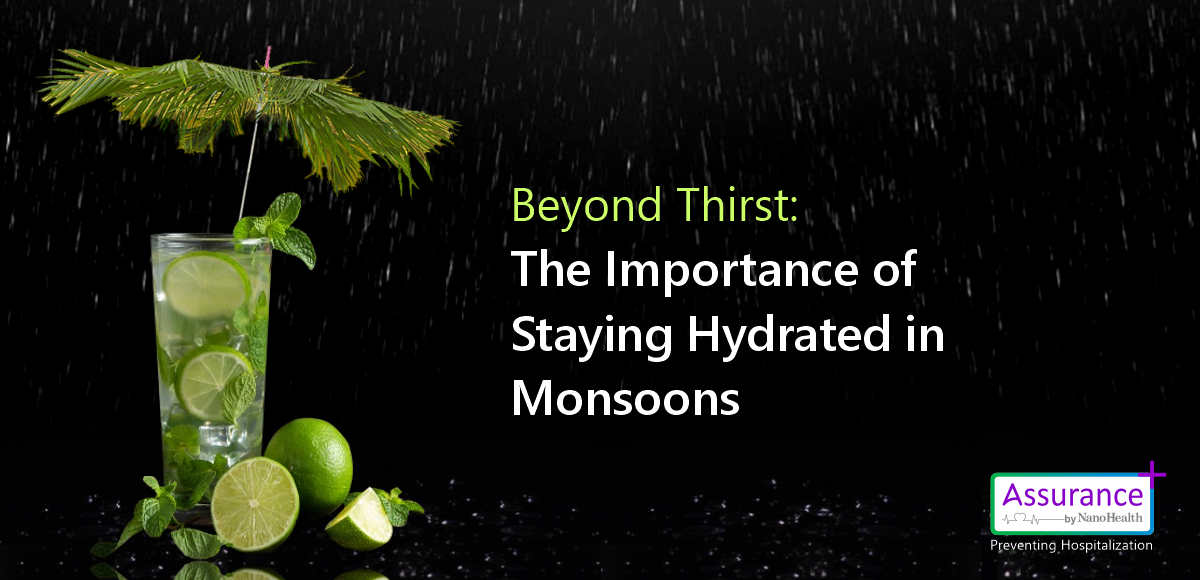

“Drinking water is essential to a healthy lifestyle. It fuels your body, quenches your thirst, and keeps you going strong."
The monsoon season is like a refreshing balm for our souls, rescuing us from the scorching heat and reviving everything with its delightful downpour. But here's a surprising fact: Many people think that staying hydrated is less important during rainy days. Why? Because they don't feel as thirsty as they do during hot summers.
But hold on, dear readers, because we're about to debunk this misconception and shed light on the true significance of staying hydrated in monsoons.
Understanding the Impact of Monsoons on Hydration
Monsoons have a unique way of impacting our lives with their extraordinary weather patterns. As rain pours and humidity rises, it's important to understand how these conditions influence our hydration needs.
Contrary to what you might think, staying hydrated remains just as crucial during the monsoon season as during the summers, because the increased humidity in monsoons can lead to excessive sweating, causing our bodies to lose important fluids and electrolytes.
Moreover, the constant rainfall might fool us into thinking we don't need as much water. But the truth is, our bodies still require sufficient hydration to function at their best.
Signs of Dehydration
When it comes to staying hydrated, relying solely on thirst can be misleading, especially during the monsoons. As rain falls and the weather cools, it's easy to underestimate our body's need for fluids. However, it becomes even more crucial to pay attention to other signs that indicate dehydration.
Fatigue is a common symptom of dehydration, regardless of the weather. When our bodies lack enough fluids, our energy levels drop, leaving us feeling tired and sluggish. Dry skin is another indicator, as it struggles to retain moisture. With increased humidity and reduced water intake during monsoons, your skin might feel parched and dull along with dry hair, dry lip and cracked heels.
Headaches are also a sign of dehydration. When our bodies aren't properly hydrated, it affects blood and oxygen flow to the brain, resulting in headaches and even migraines. By paying attention to these symptoms and ensuring regular fluid intake, we can proactively maintain our hydration levels and keep our bodies functioning optimally throughout the year, no matter the weather conditions.
The Benefits of Staying Hydrated in Monsoons
Apart from quenching your thirst, proper hydration in monsoons offers a multitude of benefits for your overall health and well-being.
1. Staying hydrated supports your immune system
Rainy seasons bring an increased risk of waterborne diseases and infections. By keeping yourself well-hydrated, you help your body flush out toxins more efficiently, maintaining a strong defense against illnesses.
Hydration also supports the functioning of your immune cells, preventing infections and boosting your overall resistance to diseases.
2. Staying hydrated enhances your mental and physical performance
Dehydration can negatively affect cognitive functions like memory and focus. By drinking enough water, you promote optimal brain function, improving concentration and productivity.
Additionally, proper hydration helps regulate body temperature, preventing heat-related fatigue and improving physical performance, whether you're enjoying outdoor activities or working towards your fitness goals.
3. Staying hydrated contributes to your overall well-being
Water plays a crucial role in various bodily functions, including digestion, nutrient absorption, and toxin elimination. By ensuring adequate hydration, you support these essential processes, promoting a healthy digestive system and radiant skin.
Hydration also helps prevent muscle cramps and keeps your joints lubricated, keeping your body flexible and agile.
Practical Tips for Staying Hydrated in Monsoons
Here are some simple tips to help you stay hydrated during the monsoon season:
1. Drink water regularly, even when not feeling thirsty: Make it a habit to drink water consistently throughout the day. This ensures a steady intake of fluids and helps maintain optimal hydration levels.
2. Include hydrating foods and beverages in your diet: Enjoy fruits and vegetables with high water content, such as watermelon, cucumbers, oranges, and lettuce. These not only provide hydration but also supply essential vitamins and minerals. Herbal teas like peppermint or chamomile can also be hydrating and refreshing options.
3. Pay attention to electrolytes and minerals: Electrolytes are crucial for maintaining fluid balance and supporting bodily functions. Replenish electrolytes by consuming natural sources such as coconut water (rich in potassium) or including foods like bananas, spinach, and yogurt in your diet.
4. Limit caffeine and avoid alcohol consumption: While it's okay to indulge in hot beverages or alcoholic drinks during the rainy season, remember to moderate your intake. Balance it with increased water or other hydrating alternatives. If you find it difficult to abstain from consuming alcohol, perhaps you could consider substituting it with red wine as an alternative.
We understand that staying hydrated during the monsoon season is just as crucial as any other time, and therefore, we want to ensure you're equipped with the knowledge and support to make the right choices.
Assurance by NanoHealth: Your trusted healthcare partner!
Assurance by NanoHealth is here to be your trusted companion on your journey to a healthy life through maintaining optimal hydration levels. With our team of health experts, we are ready to guide you towards personalized hydration guidelines tailored to your needs.
By connecting with our health experts, you can receive personalized guidance that will not only help you maintain ideal hydration levels but also boost your overall well-being.
Visit our website at www.nhassurance.com or give us a call at +91 91004 44004 to connect with our dedicated team of health experts. Together, let's make hydration a priority and unlock the full potential of your well-being!
